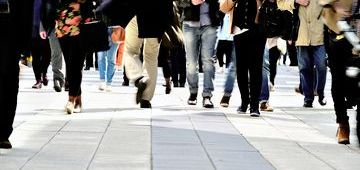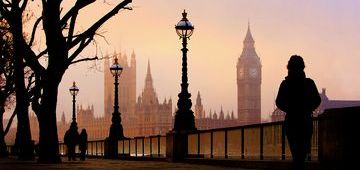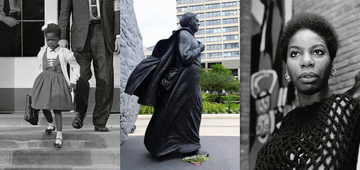With non-essential shops due to reopen in England on 15 June, new research commissioned by RSPH shows that even for those shops that do reopen their doors, the high street buzz is unlikely to return for some time, sparking renewed fears for the future of our towns and city centres.
The polling unveiled a ranking of high street establishments the public are least likely to visit once they reopen. Key findings included that:
- One in two (46%) of the public plan to visit major high street establishments less often than before the pandemic – including pubs, bars, restaurants and cafes, once they’re reopened.
- Only around one in four would feel safe enough to return to pubs and bars (26%), gyms (27%), beauty salons (26%), restaurants (25%) and public toilets (28%) as soon as they reopen.
- For one in two of the public, it will take at least three months after reopening before they feel safe visiting these outlets again.
- One in four (26%) plan to cut their hair at home more often in the future.
- Twenty-nine percent said they were less likely to be able to visit their high street, due to concerns about the public transport they need to take to get there. This was higher in London, at 45%.
The findings show that, beyond the direct economic impact that lockdown has had and will continue to have on the high street and consumers, there will also be a damaging effect on shopping behaviour that will likely be felt for some time – with many previous customers not returning to their favourite outlets for a number of months.
Whether this is down to changes in habits and behaviours, or continued safety concerns about the virus, it will take time for the public to feel comfortable once more, and the majority are in favour of high street retail outlets putting in measures to protect their staff and customers:
- Nine in ten (87%) think high street retail outlets should provide protective equipment and hand sanitiser for all staff when they reopen.
- Eight in ten (83%) think high street retail outlets should provide hand sanitiser for all customers when they reopen.
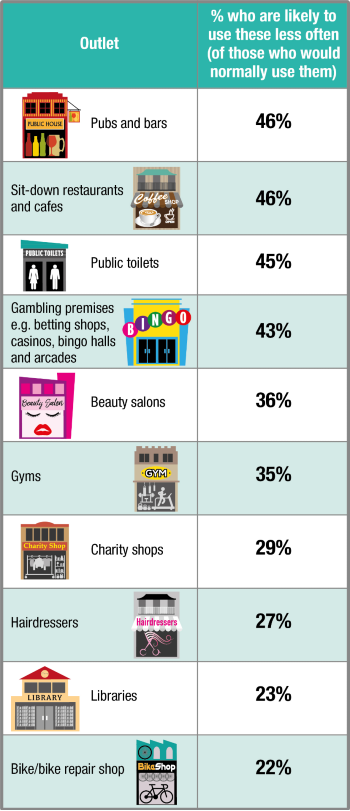
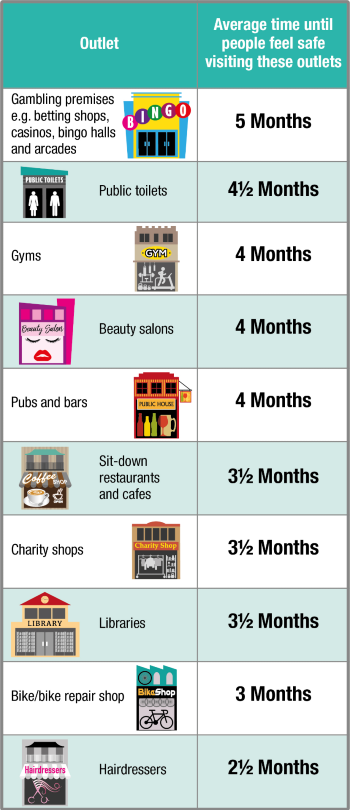
As the latest figures indicate thousands of retail and hospitality jobs will be lost due to shop closures, investment in our high streets is needed urgently. RSPH’s Health on the High Street campaign called for action to reinvigorate high streets to address the proliferation in empty shops and ultimately improve the healthiness of local communities. Events of 2020 have brought back into sharp focus the need for fairer taxation of online retailers – who have in general prospered during lockdown – to ensure they are not put at an unfair advantage compared to brick-and-mortar businesses. This has strong backing from the public, three quarters of whom (73%) believe that online businesses such as Amazon should pay business rates in line with high street businesses.
Duncan Stephenson, Deputy CEO of RSPH, said:
"New forecasts show that the UK’s economy will be one of the worst hit of any advanced nation in 2020. High streets have been on a gradual decline in recent years, and in the past few months most retailers have reported huge losses. The coronavirus pandemic has drastically changed the way we shop and the way we relate to our local area, and our research shows just how much of an obstacle this will be if we are to breathe new life into our high streets.
“High streets are vitally important for their local communities and COVID-19 has exacerbated the challenges they are facing. We must use this as an opportunity to rethink how we use our high streets in the future, bring local communities together and support their economies – but this will not happen without genuine and lasting investment from central Government. As we emerge from lockdown, our high streets need their own post-pandemic treatment if they are going to survive.”

